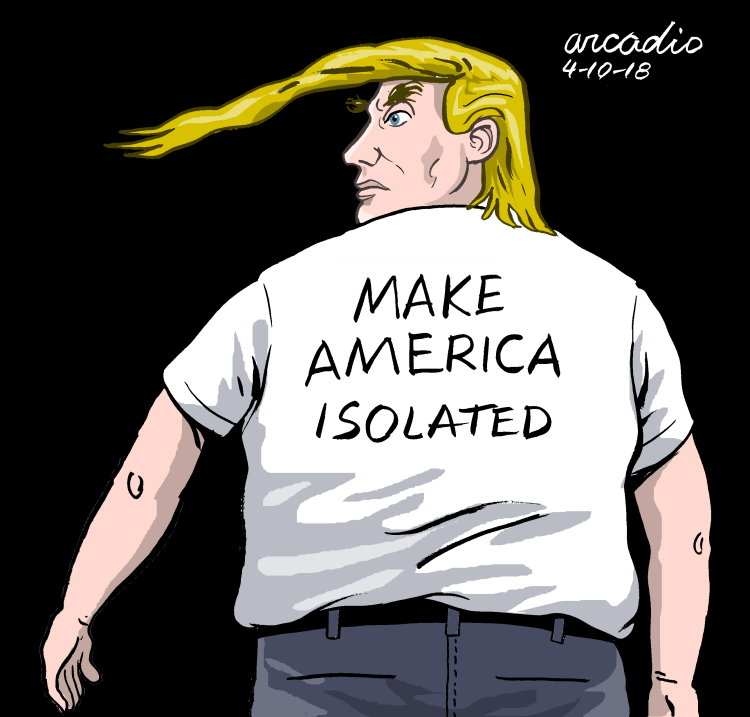
Observers of the most significant shifts taking place in U.S. foreign policy will find that America is withdrawing from its political and legal commitments. This is a matter of great concern, especially when those commitments are clearly connected to issues of security, stability and international peace, as is the case in the many American attempts to renounce its domestic and international legal obligations. These efforts are worrisome in light of issues and trends that are impacting the current international balance of power, as well as nations whose interests differ from the U.S. on the global chessboard.
I imagine that the main reason for this situation is the Trump administration’s effort to restore the United States’ position as a central global power, a status from which the U.S. has been in retreat since the beginning of the 21st century. These efforts, attempted by way of recklessly imposing American strength, seek to build a political and legal environment that is aligned with American political tendencies and international interests, even if this involves renunciation of binding international commitments, agreements and treaties, or even challenging international law itself. The goal is to build new agreements and treaties that would be better aligned with the vision and interests of the U.S. in the coming period.
The U.S. withdrawal from the Iran nuclear deal and the Intermediate-Range Nuclear Forces Treaty are some of clearest and most prominent examples of the American retreat from its legal commitments. From another perspective, the withdrawals also exemplify the political and military situations that have increased tension, chaos, unstable national security and international violence in 2018 and 2019. We see this clearly in international reactions to these decisions, and specifically in the reactions of the states most directly concerned, namely Russia and Iran.
Unfortunately, the U.S. didn’t stop at its desire to withdraw from its international political and legal agreements and treaties, but went much further by moving to provoke the countries which withdrew from treaties alongside the U.S. Even merely cooperating with certain countries came to be seen as dangerous. After withdrawing from the Iranian nuclear deal despite the objections of the rest of the deal’s signatories, the U.S. escalated the dispute by widening the circle of sanctions and tightening those already in place. This pushed the Iranian government to reconsider the matter of exceeding 300 kg of enriched uranium as agreed upon (approximately 661 pounds), and the Iranian president stressed in this context that “Europe doesn’t have much time left to save the nuclear deal, and the collapse of the nuclear deal is not in the interests of the region or the world.”
The withdrawal of the U.S. from the Intermediate-Range Nuclear Forces Treaty with the other global great power, Russia, is among the most dangerous American actions to negatively impact international security and stability. The Russians responded by suspending work on the treaty, which will doubtlessly lead, if the situation continues, to another strategic global arms race. In addition, it poses concerns and dangers to many global powers such as China.
It was in this context that Mikhail Gorbachev, the last leader of the Soviet Union, said that “the decision of American President Donald Trump to withdraw from the nuclear weapons treaty is a big mistake.” For his part, Russian Deputy Foreign Minister Sergei Ryabkov commented by saying, “The plan of the United States to withdraw from the Intermediate-Range Nuclear Forces Treaty will be an incredibly dangerous step.”
In summary, the United States in the era of President Donald Trump is seeking to reconsider many of its international legal commitments, which is undoubtedly its right to do. But unfortunately, this is being done unilaterally and in a dangerous, provocative and escalatory style. This turns this right into a violation and constitutes an infringement of others’ rights, especially since the entire international community is on the other side of the issue. The existence of other powers with global standing no less prominent than the U.S., such as Russia and China, cannot be overlooked, and they are also capable of escalation.
Surely, the continuation of this reckless American approach to its international legal obligations will adversely affect the world’s view of the United States, and will push the U.S. into a new place of isolation. This approach will lead to more doubts about America’s integrity and a decline in confidence in the U.S. regarding many future international security and political developments. Considering that the U.S. is the largest world power and is supposed to be the defender of the rule of law, this current approach will inspire fear that the U.S. will withdraw from its many other standing commitments around the world. In addition, this approach poses many dangers to global peace and security, especially in the Middle East.

Leave a Reply
You must be logged in to post a comment.